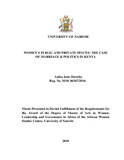| dc.description.abstract | This thesis sought to examine a woman politician`s private and public spaces and see how the two concepts intertwine in her life. It analyses the impact of one space on the other and the resulting consequences. In addition, it delves into the society`s definition and demarcation of public and private spaces and in particular focuses on female politicians and their manifestation of public and private spaces. It goes on to explore the fact that a woman`s private space directly impacts her private space. The general objective of the study was to examine the Kenyan state of public and private spaces of women with a focus on politics. The study was guided by the following specific research objectives: to describe the historical context of Kenyan women public and private spaces, to examine the challenges of married women seeking public office in Kenya face and to examine selected women politician`s response to their public and private spaces. The theoretical framework used was feminist political theory. The theory denotes that patriarchy has power and dominance over women due to anchored societal and state structures that are designed to systematically maintain women in a position of subordination. This theory examines why the dominance of women over men consistently affects women`s entry into the public space. The case study method dominated the compilation of data in this thesis with a feminist approach. The methodology in this thesis reviewed case studies using an interdisciplinary approach in reviewing literature for understanding definitions of feminism, women`s movements, iconic women in the struggle. This study included a selection of female politicians in Kenya in major positions such as governors, senators, women representatives and member of parliaments. Data was collected using secondary sources such as books, papers, scholarly journals documents and scripts ranging from anthropology, sociology, political science, literature, and film on women`s movements and liberations with focus on public and private spaces. Thematic analysis thereby follows a comparison of different perspectives of the writers and finally researcher’s response. The key findings were that indeed a woman`s private space directly impacts her public space more often than not in a negative manner. The thesis concludes by noting that deliberate efforts need to be made to avoid the double standard of societal judgment on female politicians and work on changing the narrative to provide equal access, opportunity and fighting chance in elections.The investigation recommends that political gatherings ought to create instruments or unique measures to expand the quantity of women’s` participation in party administration and basic leadership positions. Likewise, they ought to give clear principles to create societal buy in into women leadership to permit important contribution from women in the political parties. Political parties should invest in women programs at the grass root level thereby changing the public narrative on the treatment of women during the “heat” of the political processes in Kenya. | en_US |



